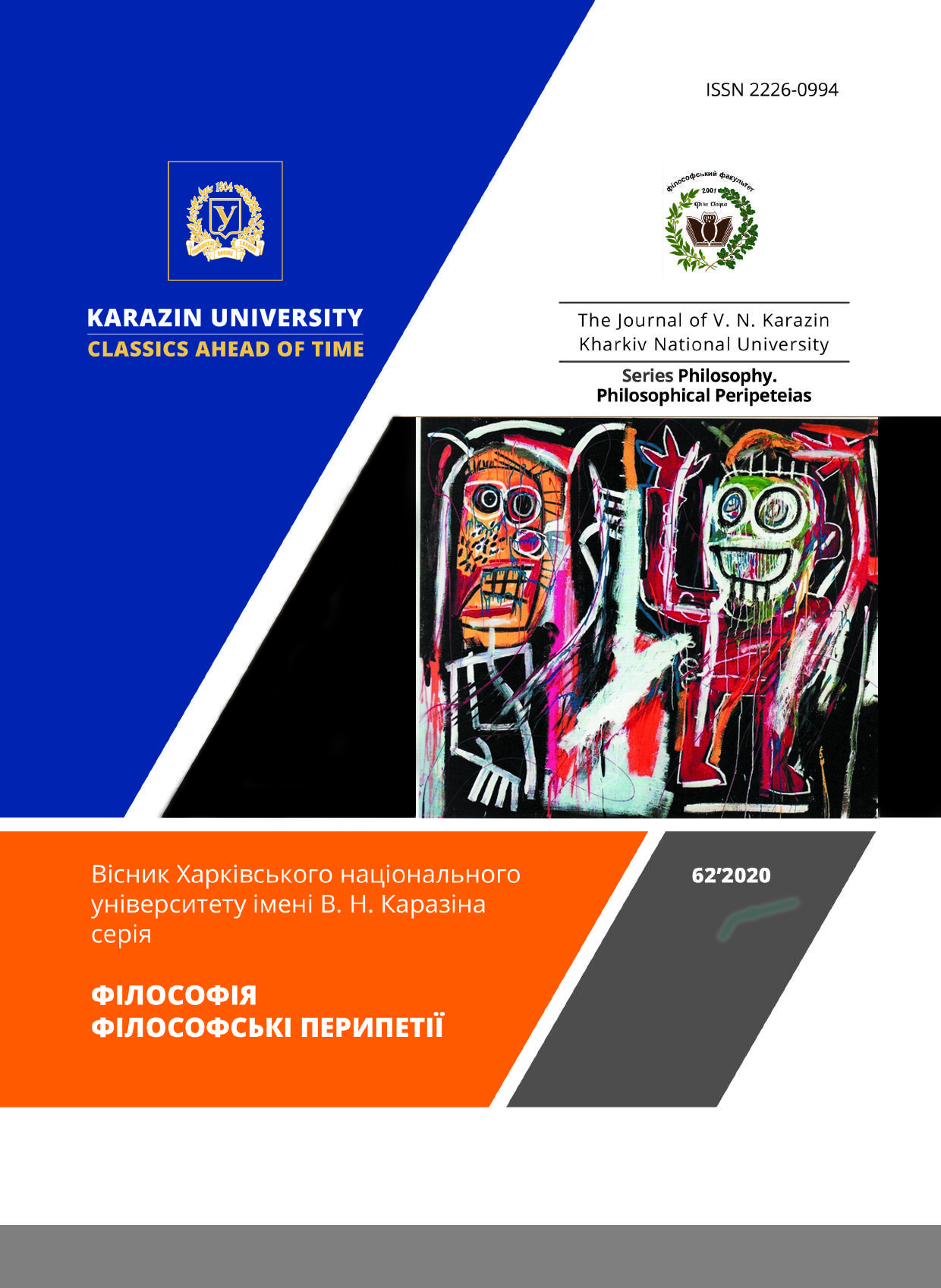"ABYSS" BY YU. V. MAMLEEV: GENESIS, DYNAMICS OF DOCTRINE, ONTOLOGICAL PROBLEM
Abstract
The article is devoted to the genesis, dynamics, and ontological problem of Mamleev`s doctrine of the Abyss. The author identifies five reasons for the emergence of such an extraordinary doctrine: the crisis of the 20th century and underground philosophizing, rootedness in Russian culture and Mamleev`s national self-identity, the influence of oriental metaphysics and integral traditionalism, artistic origins of Mamleev`s way of thinking and the connection between philosophy and literature, Mamleev`s mystical experience and his spiritual insights. Considering the dynamics of the doctrine of Abyss, the author of the article points out three stages of its development: formation of I-utrism as an opportunity to preserve the personality in the form of a higher I upon reaching the Absolute; enlightenment the depths of the invisible layers of space and creating the "Last Doctrine"; revealing the idea of Eternal Russia as a mediator between the Absolute and the Abyss. In addition, the author of the article examines the possibility of reconciling radicalism Mamleev's I-utrism with his own doctrine of Eternal Russia. Reconciliation becomes possible precisely within the context of the dynamics of Mamleev's doctrine of the Abyss. Studying the ontological problem of the ratio of the Absolute and the Abyss, the author notes, that at the metaphysical level, which is esoteric in nature, the Absolute and the Abyss are identical and cannot be conceived separately. However, at the religious level, which is exoteric in nature, they can be opposed to each other. Wherein, the transcendence of the Absolute is regarded as given to man and which can be attained, and the transcendence of the Abyss regarded as not given to man and as fundamentally unattainable. The author of the article concludes that consideration of the genesis and dynamics of Mamleev's doctrines can be helpful in understanding and solving the paradoxes, which arise when the Abyss is introduced into traditional metaphysics.
Downloads
References
Berdyaev, N. (1990). The Fate of Russia. Moscow: MSU publishing. (In Russian).
Cassirer, E. (1988). An Essay on Man: An Introduction to a Philosophy of Human Culture. Man’s Problems in Western Philosophy: Collected Works. Moscow: Progress. (In Russian).
Cassirer E. (1990). The Power of Metaphor. The Theory of Metaphor: Collected Works. Moscow: Progress. (In Russian).
Frank, S. (1990). Essays. Moscow: Pravda. (In Russian).
Honcharov, S. (2019). Yuriy Mamleev’s Сreative Writings: Philosophy and/or Literature? The Journal of V. N. Karazin Kharkiv National University, Series "Philosophy. Philosophical Peripeteias", 61, 72-78. (In Ukrainian).
Honcharov, S. (2020). Mamleev's I-utrism as a Special Kind of Metaphysics. The Journal of V. N. Karazin Kharkiv National University, Series "Philosophy. Philosophical Peripeteias", 62, 139-147. (In Ukrainian).
Guenon, R. (2020). Introduction to the Study of the Hindu doctrines. Moscow: Belovodye. (In Russian).
Guenon, R. (2019). The Crisis of the Modern World. Moscow: Academic project. (In Russian).
Lakoff G., Johnson M. (1990). Metaphors We Live By. The Theory of Metaphor: Collected Works. Moscow: Progress. (In Russian).
Mamleev, Yu. (2011). Eternal Russia. Moscow: Eksmo. (In Russian).
Mamleev, Yu. (1993). Selected works. Moscow: TERRA. (In Russian).
Mamleev, Yu. (2017a). Memories. Moscow: Tradition Publishing Group. (In Russian).
Mamleev, Yu. (2009) Russian Trips to the Subtle World. Moscow: AST: Zebra E. (In Russian).
Mamleev, Yu. (2002) Shatuny. Moscow: Ad Marginem. (In Russian).
Mamleev, Yu. (2009). The Destiny of Being. Moscow: Enneagon. (In Russian).
Mamleev, Yu. (2019). The Destiny of Being – Path to Philosophy (interview "Questions of Philosophy", No. 9, 1993). Articles and interviews: collected works. Moscow: Tradition Publishing Group. (In Russian).
Mamleev, Yu. (2017b). The Last Comedy. Collected works. Volume 2. Moscow: Exmo. (In Russian).
Mamleev, Yu. (2001). The Wandering Time. Petersburg: Limbus Press. (In Russian).
Ortega y Gasset, J. (1990). Two Great Metaphors. The Theory of Metaphor: Collected Works. Moscow: Progress. (In Russian).
Copyright (c) 2021 Семен Гончаров

This work is licensed under a Creative Commons Attribution 4.0 International License.
Authors who publish with this journal agree to the following terms:
- Authors retain copyright and grant the journal right of first publication of this work under the terms of a license Creative Commons Attribution License 4.0 International (CC BY 4.0).
- Authors are able to enter into separate, additional contractual arrangements for the non-exclusive distribution of the journal's published version of the work (e.g., post it to an institutional repository or publish it in a book), with an acknowledgement of its initial publication in this journal.
- Authors are permitted and encouraged to post their work online (e.g., in institutional repositories or on their website) prior to and during the submission process, as it can lead to productive exchanges, as well as earlier and greater citation of published work.






3.gif)




